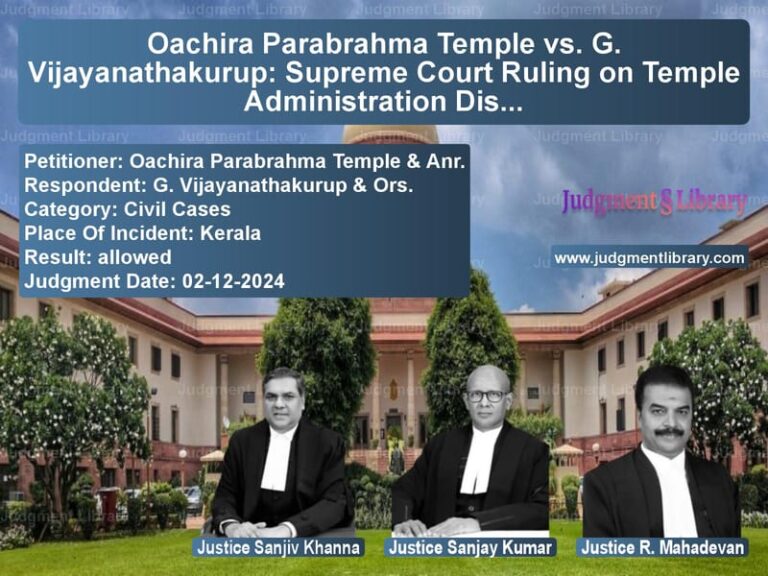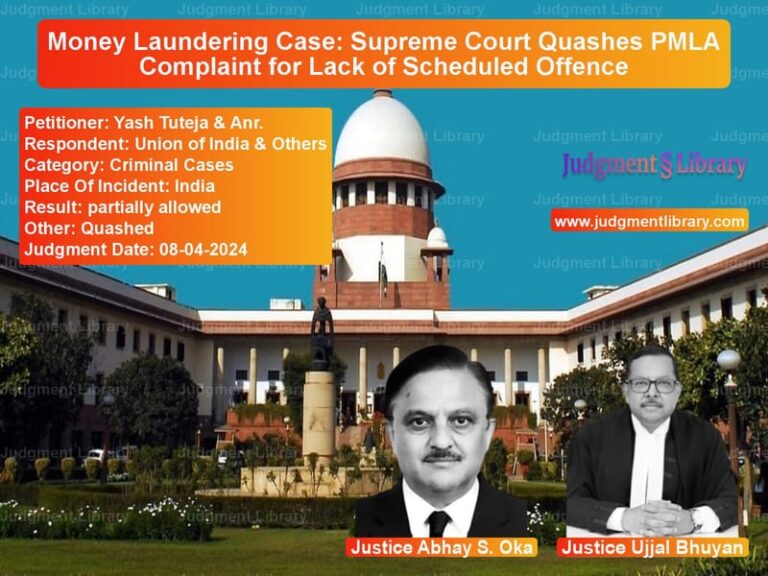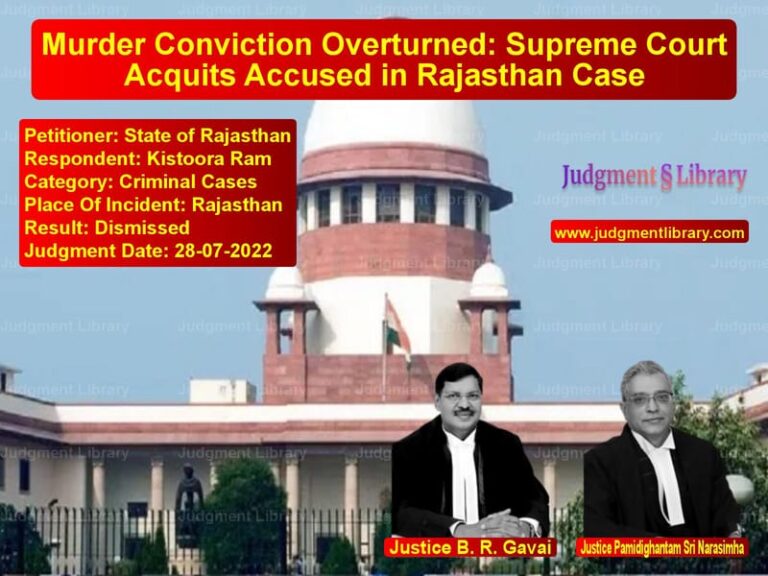Supreme Court Quashes Criminal Case Over Property Dispute: Civil Remedy Suggested
The Supreme Court of India recently delivered a significant verdict in the case of Kunti & Another vs. State of Uttar Pradesh & Another, which revolved around a property transaction dispute. The case, initially registered under multiple sections of the Indian Penal Code (IPC), including charges of cheating and forgery, was ultimately quashed by the Supreme Court. The court emphasized that the dispute was purely civil and did not warrant criminal prosecution.
Background of the Case
The appellants, Kunti and another individual, were Bhumidars (landowners) of an agricultural land located in Akbarpur, Bulandshahr, Uttar Pradesh. The land in dispute, registered under Khasra No. 561/1, was allegedly the subject of an agreement to sell, executed on July 11, 2008, in favor of Respondent No. 2, Ajay Kumar Bansal. The agreed sale consideration was Rs. 10,80,000, of which Rs. 6,30,000 was allegedly paid in advance, with the remaining Rs. 4,50,000 to be paid at the time of execution of the sale deed.
The execution of the sale deed was extended by mutual agreement until December 31, 2008. However, on the scheduled date, the respondent claimed that while he was present with the balance amount, the appellants failed to appear, leading to a dispute. Respondent No. 2 later filed a complaint alleging fraud, forgery, and breach of trust, which resulted in the registration of an FIR under Sections 406, 420, 467, 468, 417, and 418 of the IPC.
Read also: https://judgmentlibrary.com/supreme-court-rejects-mercy-petition-in-beant-singh-assassination-case/
Arguments by the Appellants
The appellants argued that:
- The agreement to sell was void ab initio (invalid from the outset) due to provisions in Section 157(A) of the Uttar Pradesh Zamindari Abolition & Land Reforms Act, 1950, which prohibited the transfer of Scheduled Caste land to a non-Scheduled Caste individual without prior permission from the Collector or District Magistrate.
- The criminal complaint was filed four years after the agreed execution date of the sale deed, making the case suspicious.
- The agreement itself was forged, and a report regarding the same had been submitted to the Senior Superintendent of Police.
Arguments by the Respondents
Respondent No. 2, the complainant, contended that:
- The appellants had received Rs. 6,30,000 as advance payment and deliberately failed to execute the sale deed.
- The appellants had intended to defraud him and were attempting to sell the same land to another party.
- The criminal case was justified as the appellants had engaged in fraudulent misrepresentation.
Key Observations by the Supreme Court
1. The Dispute is Civil, Not Criminal
The Supreme Court held that the allegations primarily concerned a contractual breach, which does not automatically constitute a criminal offense. The court cited its earlier ruling in Sarabjit Kaur vs. State of Punjab, stating:
“A breach of contract does not give rise to criminal prosecution for cheating unless fraudulent or dishonest intention is shown right at the beginning of the transaction. Merely failing to keep a promise will not be enough to initiate criminal proceedings.”
2. No Evidence of Fraudulent Intent
The court examined the records and found no evidence indicating that the appellants had a dishonest intent at the time of the agreement. It referred to the precedent set in ARCI vs. Nimra Cerglass Technics (P) Ltd., which emphasized:
“The distinction between mere breach of contract and the offense of cheating depends upon the intention of the accused at the time of the transaction. If fraudulent intent is established from the beginning, criminal liability attaches.”
3. Criminal Law Should Not Be Used for Civil Disputes
The court expressed concern over the increasing trend of using criminal law as a tool to resolve civil disputes. It cited Indian Oil Corporation vs. NEPC India Ltd.:
“Any effort to settle civil disputes and claims, which do not involve any criminal offense, by applying pressure through criminal prosecution should be deprecated and discouraged.”
4. Quashing of Criminal Proceedings
The Supreme Court concluded that the case lacked any ingredients of a criminal offense and quashed the FIR. The court also clarified:
“The complainant retains the right to pursue appropriate remedies under civil law for breach of contract or specific performance.”
Conclusion
The Supreme Court’s decision in this case reaffirms the principle that criminal law should not be misused to settle civil disputes. While a breach of contract may entitle a party to seek civil remedies, it does not automatically justify criminal prosecution unless there is clear evidence of fraudulent intent. By quashing the FIR, the court has provided relief to the appellants while preserving the respondent’s right to seek redress through civil proceedings.
Petitioner Name: Kunti & Another.Respondent Name: State of Uttar Pradesh & Another.Judgment By: Justice Krishna Murari, Justice Sanjay Karol.Place Of Incident: Bulandshahr, Uttar Pradesh.Judgment Date: 03-05-2023.
Don’t miss out on the full details! Download the complete judgment in PDF format below and gain valuable insights instantly!
Download Judgment: kunti-&-another-vs-state-of-uttar-prade-supreme-court-of-india-judgment-dated-03-05-2023.pdf
Directly Download Judgment: Directly download this Judgment
See all petitions in Fraud and Forgery
See all petitions in Contract Disputes
See all petitions in Property Disputes
See all petitions in Judgment by Krishna Murari
See all petitions in Judgment by Sanjay Karol
See all petitions in allowed
See all petitions in Quashed
See all petitions in supreme court of India judgments May 2023
See all petitions in 2023 judgments
See all posts in Criminal Cases Category
See all allowed petitions in Criminal Cases Category
See all Dismissed petitions in Criminal Cases Category
See all partially allowed petitions in Criminal Cases Category







